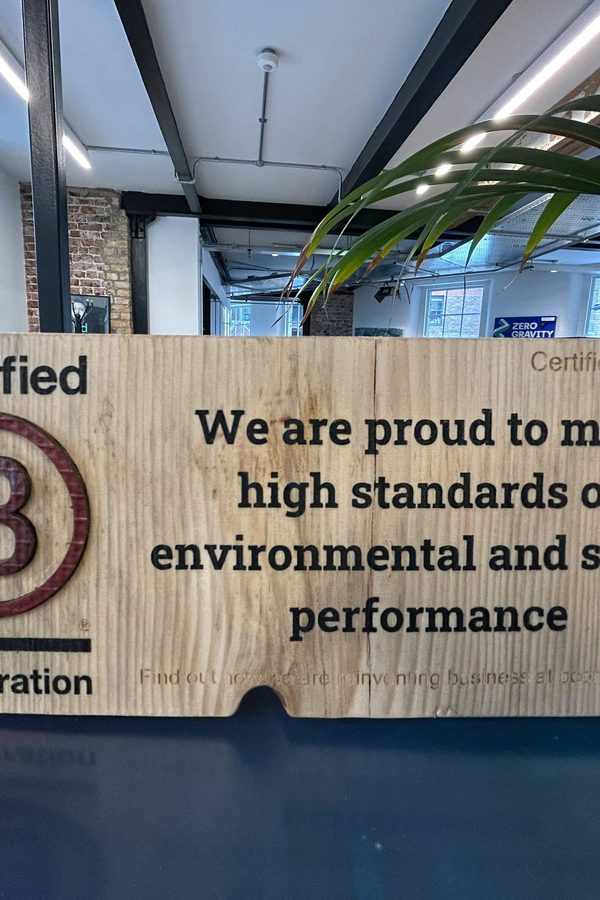
Tom Cockbain, Zero Gravity’s Brand Engagement Manager, talks through Zero Gravity’s journey from bedroom startup to a B Corp certification in the top 5% of organisations worldwide, breaking down the intersectionality between the climate equity, social mobility and big business.
On one of my first days at Zero Gravity, I put my Environmental Science Degree to good use and bought us some new recycling bins. Since then, the lunchtimes I’ve spent traversing central London to find the best TooGoodToGo deals have been, in my opinion, well worth it for a half price sushi tray. It’s fair to say that I’ve built up a bit of a personal brand in the office, for better or for worse... The team will fully know that an earwig of environmental malpractice, such as misplaced recyclable cups, taps left running, or hell forbid, internal flights, will cause a gradual buildup of steam from my ears…
So, when our founder and CEO, Joe asked me if I wanted to look into getting us B Corp Certified last year, naturally my ears pricked up. Albeit, we were a small team with limited resource. It’s rare for seed stage startups to pursue such time intensive certifications. But since day one we’ve had a ‘do as you say’ attitude to the business. From starting Zero Gravity with the last £200 of Joe’s student loan, Zero Gravity has snowballed into a groundbreaking tech platform that has propelled 8000+ students into uni, deployed £1.4 million in scholarships and doubles students chances of entering elite careers. Our north star has always been creating the largest tech-powered community that boosts social mobility, and becoming a B Corp enables us to prove that we embody those values across every stakeholder in the business. Now, here we are a year later, fully certified, with aw staggering score of 133.2, which not only certifies us as a B Corp business, but also puts us in the top 5% of certified companies worldwide.
For me, having a strong social mission at a tech-for-good startup is just the first step in achieving business outcomes that ‘do good’ in the world. But it’s not that simple. A tech-for-good company's true measure is to assess your performance across the board, against rigorous standards like B-Corp.
Why B Corp, you ask?
First things first, let's demystify what B Corp Certification is. In simple terms, it’s like the most rigorous standard for businesses that want to do good for the world while doing well financially. It’s not just about making profits; it's about making a positive impact on society, employees, communities, and the environment.
The B Corp community is full of purpose-driven businesses that have identified an industry with a clear problem in their social, environmental or governance position. For instance, Too Good To Go, with its revolutionary app, has become a force against food waste, saving millions of meals and reducing carbon emissions significantly. Similarly, Tony’s Chocolonely is reshaping the chocolate industry by advocating for 100% slave-free chocolate and setting new standards in supply chain transparency.
We at Zero Gravity have shown that social mobility is stagnant in the UK, and needs to change. Talent is spread evenly, but opportunity is not. Students from the most advantaged areas of the UK are currently over six times more likely to secure a place at a highly-selective university than those from the most disadvantaged areas (OfS, 2020). This imbalance exists despite the fact that 50,000 students from low-opportunity backgrounds achieve top GCSEs each year, with only one-third of them attending highly selective universities and even fewer securing elite graduate careers (Crawford et al., 2016).
At its core, Zero Gravity is more than just an organisation; it's a social movement. With a mission to bridge the opportunity gap, Zero Gravity has been unlocking potential by propelling students from low-income backgrounds into universities, careers, and ultimately life-changing opportunities. Achieving such a high B Corp score isn't just about bragging rights. It's a rigorous, independent validation of our narrow focus on outcomes across our community, rather than company growth and valuation.
Outcomes are at the forefront of everything we do at Zero Gravity. But as a catalyst for unprecedented social mobility in the UK, it’s also crucial that we reflect these values internally . That’s why our internal operations mirror our external values. Achieving B Corp certification is a testament to this alignment. It validates not just our impactful outcomes, but also our commitment to governance, community, employee welfare, and environmental stewardship. This certification is more than an accolade; it's a tangible affirmation of our mission-driven ethos.
What is the Network Advantage?
At Zero Gravity, we’ve found that a significant contributor to the lack of social mobility in the UK is the lack of access to a broad professional network, namely the network advantage. State school students are more than twice as likely to report having no ‘professionals’ in their life to support their with education and career compared to private school students (Zero Gravity, Gap Zero Report 2022). For an individual, A network advantage transpires as shared common knowledge and instilled confidence, creating opportunity for those within it. This is great for those with a Network Advantage, peers with the access to information and experience required to successfully apply to the best opportunities, assure those within it that they can achieve their aims and instil a sense of belonging. But, for those without a Network Advantage, it creates a clear divide between meritocracy and opportunity.
The network advantage is something that compounds over time. Students who attend Russell Group universities earn, on average, £200,000 more in their lifetimes than their peers (Sutton Trust, 2015). This is because, despite best efforts to reform recruitment practices, elite graduate graduate careers are still dominated by graduates from such institutions. And, when we look at those same universities’ recruitment channels, the vast majority are still over-indexing on private school students.
What is the intersectionality between social mobility and environmental, social and governance performance?
So with the Network Advantage being a strong social influence on UK social mobility, where does the intersectionality with the environment come in? Climate change disproportionately affects socioeconomically disadvantaged populations, contributing to standard of living and health inequalities ((Levy & Patz, 2015); (Williams et al., 2018)). In the UK in 2024, we are already seeing how low-income communities are disproportionately impacted by the adverse effects of climate change.
A recent study by the Resolution Foundation found that around a quarter of young people aged 18-24 live in poor-quality housing, more than triple the rate of those aged 45 and over (Resolution Foundation, 2023). In recent years we have seen the result of rapid climate change on the frequency and strength of extreme weather events in the UK, including heat waves and storms (Kantamaneni & Du, 2017). Students from low-income backgrounds, although incredibly talented, are going to be at the forefront of increasing environmental impacts and instability. This climate injustice, combined with the effects of the network advantage, is going to continue widening the gap between meritocracy and opportunity unless action is taken at a scale previously unseen.
We’ve achieved a top 5% score. Why aren’t we resting on our laurels?
So once you’ve bought new recycling bins, shouted about good practice and achieved a stellar B-Corp score, what comes next? Well, our B-Corp certification at Zero Gravity isn't just a badge; it's a compass that guides our journey towards continuous improvement. This certification has been an eye-opener, revealing not only our strengths but also areas where we can do better. It's about honing our strategies and pushing ourselves to be even more impactful in our mission.
The beauty of B Corp is that it challenges us to look at our operations under a microscope and ask, "How can we do this better?" This ongoing process of self-reflection and improvement is crucial as we strive to deepen our impact.
One of the key areas we're focusing on is improving our process of measuring and offsetting our carbon emissions. As a highly dynamic early-stage startup relying heavily on tech solutions, there is limited historical data to conduct such an analysis. Over the coming year, we plan to measure and offset all emissions to become a carbon-neutral business. What’s more, as a business that fundamentally offsets traditional carbon emissions by providing network opportunities to students in remote areas, we are also motivated to analyse our scope three emissions, those being the historical emissions that are avoided through Zero Gravity’s platform. Just think , where a partner traditionally sends a speaker or mentors out to a rural school for an access programme, the scope of avoided emissions is vast as we facilitate the same approach digitally at scale.
We're also conscious that our journey doesn’t end within the confines of our office. The ripple effect of our actions reach far and wide. By setting a precedent in the tech industry and sharing our learnings and challenges, we aim to spark a broader movement towards sustainability and social responsibility. We're not just part of the B Corp community; we're active players, pushing the envelope and raising the bar for businesses everywhere.
Looking ahead, our high B Corp score is just one step in a never-ending journey of growth and improvement. We see it as a commitment to never stop striving for better – for our community, our planet, and our members’ futures.
Got any questions? Whether it's about B Corp, our mission, or who Zero Gravity is, we'd be happy to answer them here.
















